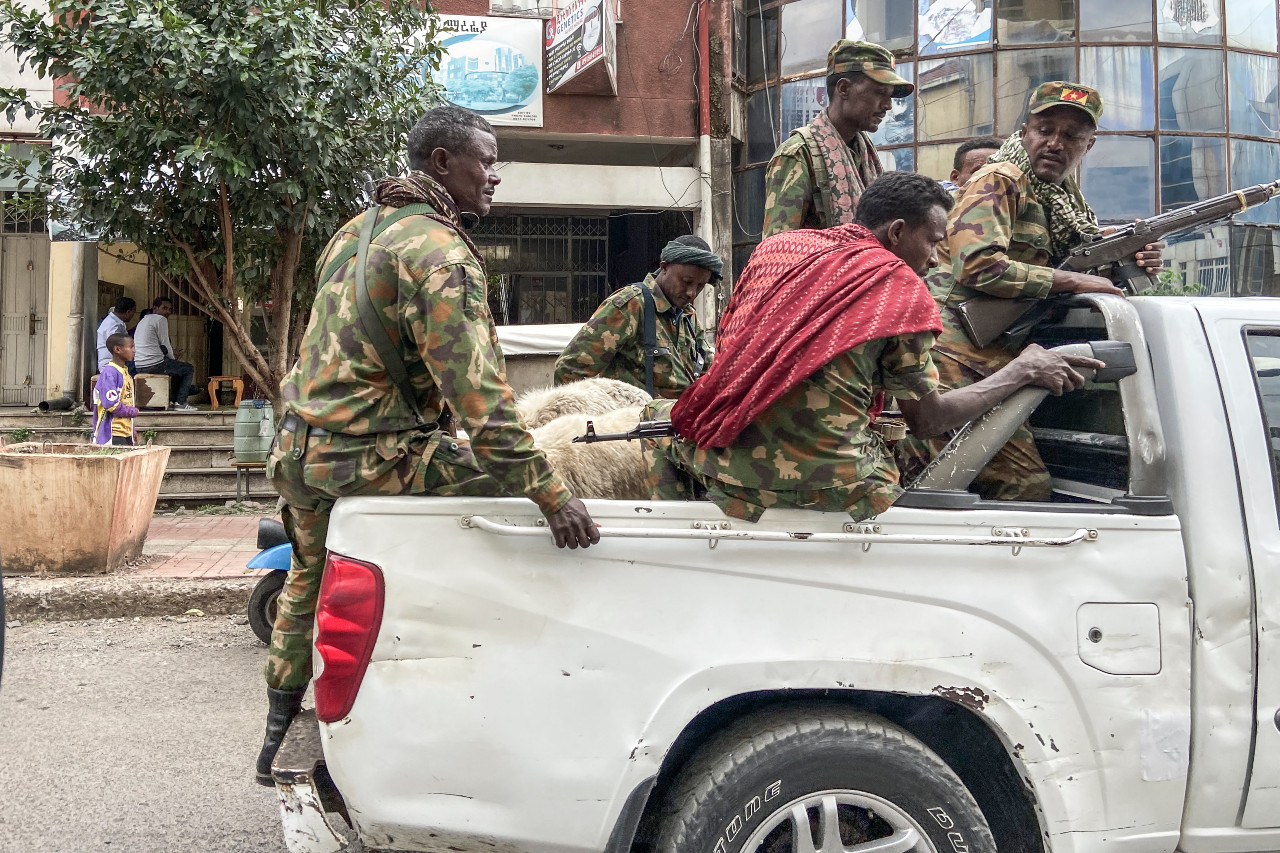Popular Reads
Top Results
Can't find what you're looking for?
View all search resultsPopular Reads
Top Results
Can't find what you're looking for?
View all search resultsAfrican bloc wants ceasefire as Ethiopia's Tigray alleges Eritrean incursion
Hundreds have died in air strikes and fighting in an escalating conflict some fear could slide into civil war given deep animosity between the Tigrayans and Prime Minister Abiy Ahmed, who comes from the largest Oromo ethnic group.
Change text size
Gift Premium Articles
to Anyone
T
he African Union (AU) called for a ceasefire in north Ethiopia where federal troops fighting local Tigrayan forces were reported to have captured an airport on Tuesday and the region's leader accused Eritrea of sending soldiers across the border.
Hundreds have died in air strikes and fighting in an escalating conflict some fear could slide into civil war given deep animosity between the Tigrayans and Prime Minister Abiy Ahmed, who comes from the largest Oromo ethnic group.
Various Tigrayan forces surrendered during the seizure of Humera airport, near the border with Sudan and Eritrea, while the military also captured a road leading from the town to the Sudanese border, the Fana broadcaster reported.
The Ethiopian Press Agency posted photos that it said showed federal soldiers, backed by forces from the neighboring Amhara region, at the airport.
However, Humera residents were going about their lives normally, the local government's communication office said, without commenting on the status of the airport.
Foreign media had no access to Tigray on Tuesday and Reuters could not confirm the reports. There was no immediate response from the Tigray People's Liberation Front (TPLF), which governs the state of more than 9 million people.
Abiy, who won the Nobel Peace Prize in 2019, ordered air strikes and sent troops into Tigray last week after accusing the TPLF of attacking a military base. Tigrayans say Abiy's government oppresses and discriminates against them and behaved autocratically in postponing a national election.
In a potential major escalation, Tigray leader Debretsion Gebremichael said the Eritrean government of President Isaias Afwerki had sent troops across the border to attack local forces in support of the federal push.
But he gave no proof and Eritrea's Foreign Minister Osman Saleh Mohammed denied it. "This is an internal conflict. We are not part of the conflict," he told Reuters by telephone.
Eritrea and Ethiopia signed a peace deal two years ago, but Afwerki's government remains hostile to the Tigrayan leadership after its role in a devastating 1998-2000 war.
The AU bloc called for peace talks and a ceasefire. "The chairperson (Moussa Faki Mahamat) appeals for the immediate cessation of hostilities and calls on parties to respect human rights and ensure the protection of civilians," it said.
Some Ethiopians, including soldiers, have begun crossing into Sudan amid fears of a refugee crisis, residents in the region and Sudanese state media say.
Reuters reporters on Monday traveling in Tigray and Amhara saw trucks packed with militia fighters and pickups with mounted machine-guns rushing to the frontline for the federal government.
Warplanes have bombed arms depots and other targets, both sides say, while aid workers and security sources have reported heavy fighting on the ground.
Military and security sources in Amhara, on the side of the federal troops, have spoken of 500 deaths on the Tigrayan side and hundreds also from the national military.
Abiy's spokeswoman denied suggestions from some diplomats that he was ignoring mediation efforts and endangering stability in the poor and turbulent Horn of Africa region.
"There is no rebuffing of anyone by the prime minister. He had acknowledged and given gratitude for the concerns shown," the spokeswoman, Billene Seyoum, told Reuters.
"Nevertheless, Ethiopia is a sovereign nation and its government will ultimately make decisions in the long-term interest of the country and its people."
The 44-year-old prime minister is Africa's youngest leader and won his Nobel prize for democratic reforms and for making peace with Eritrea. But his militancy against Tigray has alarmed diplomats and a full-scale war could further damage an economy already reeling from the coronavirus crisis.
Abiy, a former soldier who once fought alongside Tigrayans against Eritrea, took over in 2018 after a Tigrayan-led government had dominated politics since rebels from their region toppled Marxist military rule in 1991.
But his attempts to open up a repressive political climate also led to an explosion of ethnic problems, with hundreds killed and hundreds of thousands forced to flee their homes in clashes over the last two years.










